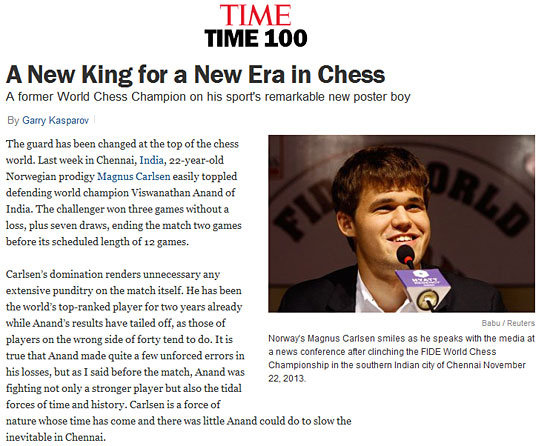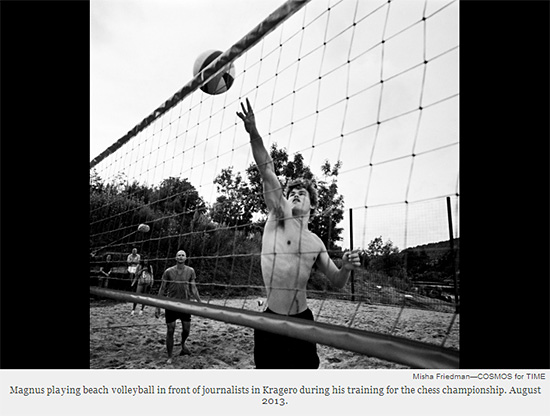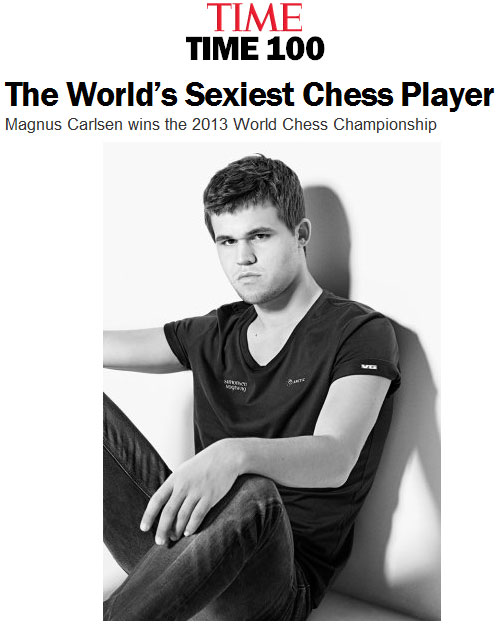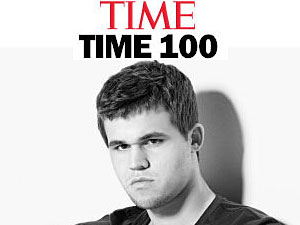Chennai aftermath: the experts opine
With the world championship match over, a variety of experts are beginning to weigh in on the match, what happened and why. The most prominent of the pundits is the irrepressible former world champion Garry Kasparov who published his personal summary of the match and Magnus Carlsen in Time Magazine.
A New King for a New Era in Chess
By Garry Kasparov Nov. 25, 2013
The guard has been changed at the top of the chess world. Last week in Chennai, India, 22-year-old Norwegian prodigy Magnus Carlsen easily toppled defending world champion Viswanathan Anand of India. The challenger won three games without a loss, plus seven draws, ending the match two games before its scheduled length of 12 games.
Carlsen’s domination renders unnecessary any extensive punditry on the match itself. He has been the world’s top-ranked player for two years already while Anand’s results have tailed off, as those of players on the wrong side of forty tend to do. It is true that Anand made quite a few unforced errors in his losses, but as I said before the match, Anand was fighting not only a stronger player but also the tidal forces of time and history. Carlsen is a force of nature whose time has come and there was little Anand could do to slow the inevitable in Chennai.

You can't go wrong with an article by Garry Kasparov on chess in Time Magazine
Carlsen’s greatest chess strength is his remarkable intuitive grasp of simplified positions and his tremendous accuracy in them. I coached Carlsen for a year, in 2009, and I was amazed at how quickly he could correctly evaluate a position “cold,” seemingly without any calculation at all. My own style required tremendous energy and labor at the board, working through deep variations looking for the truth in each position. Carlsen comes from a different world champion lineage, that of Jose Capablanca and Anatoly Karpov, players who sense harmony on the board like virtuoso musicians with perfect pitch.
The win was a great moment for Carlsen, for Norway, and for a chess world eager to embrace the charismatic young champion – who was soon afterward photographed with a huge smile on his face after being tossed into a hotel swimming pool. It was also, of course, a painful blow for Anand and India, a nation that adores its sports heroes and which Anand’s fame turned into a global chess powerhouse. I am one of few people who have been on both sides of this zero-sum equation, but my sympathies were very much with the challenger.
Click here for full Time Magazine article
Magnus Carlsen in pictures
This wasn't the first time Time Magazine covered Magnus Carlsen, and it certainly won't be the last. Just before the start of the Anand-Carlsen match, they published not one, but two photoessays around the media magnet that is Magnus.
The first was The Superstar and the Sex Symbol: The World’s Highest Ranking Chess Champions

This is but one picture of nineteen in a photoessay on both Magnus Carlsen and Vishy Anand
And the second was The World’s Sexiest Chess Player

Here the focus is clearly on the Norwegian and the gallery contains seven pictures such as above
GM Anish Giri analyzes
Still, Kasparov's view of inevitablity is not necessarily shared by everyone, and another prodigy, Dutch player Anish Giri, published his own synopsis on his personal site anishgiri.nl

So what went wrong for Anand, who kept retaining his title for six years, winning match after match? Did something happen to him or is Carlsen just so much better than Anand (as well as everyone else)? Definitely, a bit of both.
Before the match Vladimir Kramnik, who knows what he is talking about, said that Anand has to stop fearing Carlsen. I do agree, and I do think that Anand failed in that matter. Whenever I tuned it to watch the press-conference Anand was always underestimating his position. He seemed to be content with 'holding by getting enough counterplay' in game three, when the whole world, Magnus included, were instead seriously worried about our World Number One.
In the next game when Anand misplayed the opening he called his position 'basically lost', to surprise of Magnus who seemed to be quite content about the game, thinking that the draw was a logical outcome. The culmination of underestimating his position was the game five, when Anand lost, saying that his decisive mistake was Rd4, an excellent active move, which secured absolute equality. If a player with such great understanding of Anand keeps misevaluating the positions game after game, it definitely means that some psychology is involved, although we will never know whether Anand was honest about his thought after the game, or if he just wanted to confuse Magnus and all the spectators. For a while I even thought Anand was trying to get Magnus overconfident and force him to overpush eventually, but I doubt that that was the case.
Click for full article
GM Nigel Short opines
GM Nigel short, himself a former challenger for the world title agianst Kasparov in 1993, was a very active Tweeter (it will be interesting to see if this word is still in the dictionaries in 20 years time) during the world championship, commenting every opening and every result. He was certainly one of the highlights for chess fans following Twitter. He has written his own viewpoint of the match for The Indian Express.

A champion of his time
By Nigel Short
At Chennai, as Carlsen outplayed Anand, the dignified but staid image of the game changed.
As the dust settles on the Viswanathan Anand versus Magnus Carlsen match in Chennai — the biggest chess clash since Bobby Fischer vs Boris Spassky in 1972 — it is time to reflect upon its impact. The immense interest, both in India and abroad, of this most cerebral of jousts, belies the pessimist's view that chess requires Cold War rivalry to be marketable. Indians proudly cheered, and sometimes even prayed, in huge numbers, for their mighty warrior. Alas, it was always going be an unforgiving task for Anand — at almost 44, the oldest World Champion in half a century — to cling on to his crown against someone half his age and already the highest-rated player in history. Time and tide tarries for no man.
Carlsen's victory gives succour to the countless enthusiasts who feared that modern chess was becoming an ever-accelerating arms-race of computer engine analysis. It is hard to recall any World Championship match that has been so bereft of theoretical novelties, as the young Norwegian constantly sought to sidestep Anand's renowned preparation by going down less travelled paths. His simple philosophy was, in essence, "Give me an equal position that you have not studied with a computer and I will outplay you."
Click here for full article
GM Daniel King summarizes
The ever-popular GM Daniel King has produced a video summary of the world championship that we share below
World Chess Championship 2013 Anand vs Carlsen Summary
Interview by Anastasiya Karlovich
And finally, last but not least, here is an excellent interview by WGM Anastasiya Karlovich with Magnus Carlsen:
Chess World Champion Magnus Carlsen interview




























